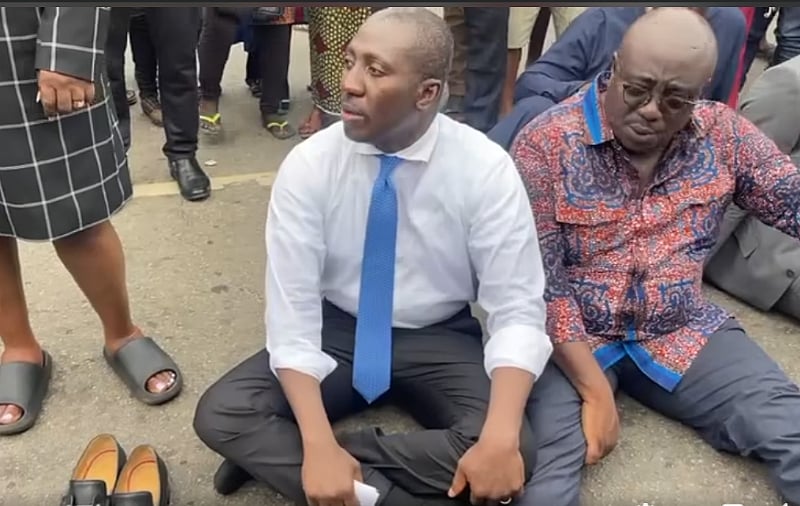The Dormaahene, Osagyefo Dr. Fredua Agyemang Badu II, a prominent traditional leader and the President of the Bono Regional House of Chiefs, publicly expressed his disapproval of Minority Leader Alexander Afenyo-Markin’s protest methods at the Economic and Organised Crime Office (EOCO) headquarters. Afenyo-Markin, along with other Minority Members of Parliament, staged a sit-in at the EOCO offices to demand the release of Bernard Antwi Boasiako, also known as Chairman Wontumi, the Ashanti Regional Chairman of the ruling New Patriotic Party (NPP). Wontumi was under investigation for alleged financial misconduct. The Dormaahene’s criticism centered on Afenyo-Markin’s decision to sit on the floor during the protest, an act he deemed unbecoming of a Member of Parliament. Employing a blend of humor and pointed critique, the Dormaahene offered to provide Afenyo-Markin with a seat for future protests, subtly suggesting the impropriety of his chosen form of demonstration. This seemingly lighthearted remark carried a deeper message about maintaining decorum and respect for institutions, even in dissent.
The context of the protest was the arrest and subsequent bail conditions imposed on Chairman Wontumi. He was apprehended in connection with alleged financial irregularities involving EXIM Bank. The bail conditions, which included a substantial GH₵50 million bond with two justifiable sureties, had not been met at the time of the protest. The Minority Caucus characterized the investigation as politically motivated, alleging that Wontumi was being targeted due to his political affiliation. Their march from Parliament to the EOCO headquarters caused a temporary disruption to traffic in Accra, highlighting the escalating political tension surrounding the case. This action, coupled with Afenyo-Markin’s protest, underscored the Minority’s staunch defense of Wontumi, further fueling the political discourse.
The Dormaahene’s intervention injected a nuanced perspective into the unfolding narrative. While acknowledging his personal affinity for Chairman Wontumi, he emphasized the importance of upholding the rule of law and ensuring due process. He stated unequivocally that personal feelings should not obstruct legal proceedings, maintaining that if anyone, including himself, commits an offense, they should be subject to investigation. This stance underlined the importance of impartiality and adherence to legal procedures, regardless of political affiliations or personal relationships. The Dormaahene’s balanced approach served as a call for both accountability and respect for the legal system.
The Dormaahene’s comments resonated within the broader political context of Ghana. The incident involving Chairman Wontumi and the subsequent protests by the Minority Caucus highlighted the deep-seated political divides and the potential for such events to escalate tensions. The Dormaahene’s intervention served as a reminder of the importance of measured responses and adherence to legal processes, even amidst political disagreements. His call for decorum and respect for institutions underscored the need for responsible conduct from political leaders, particularly during times of heightened political sensitivity.
The Dormaahene’s public critique of the Minority Leader’s protest actions was not merely a comment on the specific incident but a broader reflection on the importance of maintaining dignity and respect within the political sphere. By humorously offering to provide a seat for the Minority Leader during future protests, the Dormaahene subtly conveyed the message that expressing dissent should not come at the expense of decorum and respect for institutions. This nuanced approach served as a call for greater civility in political discourse, emphasizing the need for respectful engagement even in the face of disagreement.
The incident involving Chairman Wontumi, the ensuing protests, and the Dormaahene’s intervention brought several key issues into sharp focus within the Ghanaian political landscape. The case highlighted the delicate balance between upholding the rule of law and navigating political tensions. It underscored the importance of ensuring due process while also addressing concerns about potential political motivations in legal proceedings. The Dormaahene’s measured response, advocating for both accountability and decorum, provided a valuable contribution to the national conversation, urging a more balanced and respectful approach to political discourse and engagement. His call for adherence to legal procedures served as a reminder of the importance of upholding the integrity of institutions, regardless of political affiliations or personal relationships. The Dormaahene’s intervention exemplified the role traditional leaders can play in promoting peace and stability within the broader political context.


